
Guests
- Rachel Griffin Accursochildren’s entertainer and educator, known professionally as Ms. Rachel.
- Tareq Hailatdirector of the Treatment Abroad Program for the Palestine Children’s Relief Fund.
We speak with Rachel Griffin Accurso, the educator known to millions around the world as Ms. Rachel, who has become a leading advocate for children in Gaza. Her YouTube channel for young children became wildly popular during the COVID-19 pandemic and today has more than 16 million subscribers. Since the start of Israel’s war on Gaza, Accurso has used her social media reach to speak out for Palestinian children facing hunger, disease, injury and death. She has been hailed as the heir to Mister Rogers, the legendary PBS children’s entertainer who also used his position in families’ living rooms to speak out on social issues.
“I see all children as precious and equal. My deep care for children doesn’t stop at any border,” Accurso tells Democracy Now! in a wide-ranging interview.
We also speak with Tareq Hailat, director of the Treatment Abroad Program for the Palestine Children’s Relief Fund, who helped connect Accurso with a 3-year-old girl from Gaza named Rahaf, who lost both her legs in an Israeli airstrike. Accurso and Rahaf filmed a video in which they sing and dance together.
Hailat describes Accurso as “one of the most significant, if not the most significant, voices for Palestinian human rights” in the world. “Her advocacy has touched the hearts of people that never would have ever heard about Gaza or the Palestinian children, and that’s why her voice is so vital,” he says.
Transcript
AMY GOODMAN: Well, if you’ve spent any time around young children in recent years, our first guest may need no introduction. The Washington Post has called her the Mister Rogers of our era. Her YouTube channel has about, oh, 16 million subscribers and more than 10 billion views. In January, Netflix began licensing episodes. Her show is now the seventh most watched on Netflix in the first half of this year.
We’re talking about Ms. Rachel, the children’s entertainer, educator and mother, who’s become a worldwide sensation over the past six years, since she began posting videos for toddlers on YouTube. Much like Mister Rogers before her, Ms. Rachel hasn’t shied away from speaking out about injustice, most notably about Gaza and the plight of Palestinian children. She recently wrote on Instagram:
“I want my taxes to help children,
not kill them.
I want my taxes to feed children,
not starve them.
I want to build a better world,
not bomb it,” unquote.
In another Instagram post, Ms. Rachel said she would refuse to work with anyone who’s not spoken out against the treatment of Palestinians in Gaza. She’s also featured Palestinian children on her show.
This is a video of Ms. Rachel singing with Rahaf, a 3-year-old girl from Gaza who lost both her legs in an Israeli airstrike.
MS. RACHEL: Let’s go back to sleep, Rahaf. We’re so tired.
[singing with Rahaf] See the bunnies sleeping 'til it's nearly noon. Shall we wake them with a merry tune? They’re so still. Are they ill? Wake up soon.
Let’s pretend to sleep. [snoring]
Wake up, little bunnies!
[singing] Skip, little bunnies! Skip, skip, skip! Skip, little bunnies! Skip, skip, skip! Skip, little bunnies! Skip, skip, skip! Skip, skip, skip and stop!
Let’s hop again!
[singing] Hop, little bunnies! Hop, hop, hop! Hop, little bunnies! Hop, hop, hop! Hop, little bunnies! Hop, hop, hop! Hop, hop, hop and stop!
Yay! That was so much fun! Thank you!
AMY GOODMAN: That video has been liked over a million times on Instagram.
The 3-year-old girl in the video, Rahaf, came to the United States from Gaza for medical treatment after losing her legs in an Israeli airstrike. She was brought to the United States by the Palestine Children’s Relief Fund, which has evacuated over 250 children from Gaza.
On August 13th, Democracy Now!'s Juan González and I talked to Ms. Rachel in one of her first live interviews, as well as Tareq Hailat, the director of the Treatment Abroad Program for the Palestine Children's Relief Fund. Days after we did this interview, the State Department halted all visitor visas from Gaza, including for children who need urgent medical care. The Palestine Children’s Relief Fund decried the decision as “dangerous and inhumane.”
Let’s turn now to our interview with Tareq Hailat and Ms. Rachel.
RACHEL GRIFFIN ACCURSO: Thank you so much for having me, Amy. It’s an honor to speak with you.
Rahaf is an adorable, bright, loving 3-year-old girl. She came here through the Palestine Children’s Relief Fund, PCRF, and she was evacuated with her mom, Israa, and they’re getting therapies and treatment at the hospital and living with a host family. And she’s absolutely delightful. She’s similar to 3-year-olds I’ve worked with, because she loves to pretend, and she’s just adorable and just taking in the world, and so sweet and innocent. And then she’s unlike 3-year-olds I’ve worked with across communities, because she has lost her legs. She’s away from her dad and her brothers right now. Her —
AMY GOODMAN: They’re in Gaza?
RACHEL GRIFFIN ACCURSO: Yeah. And so, yeah, just seeing her — and also, she’s having more of her human rights respected right now. So, she’s getting medical care, and she’s getting food, and she’s absolutely thriving. This girl is going to change the — she has changed the world, and she’s going to go so far. She just has that chance now, because she has her human rights respected.
And I saw videos of her in Gaza on the hospital floor. I saw videos of her looking extremely depressed. And one of the things her mom told me is “Thank you for helping her with her mental health,” because in Gaza, she just looked so distraught. And she’s 3 years old. And 3-year-olds are so, so delightful and happy. And she just — yeah, it was just really, really hard seeing her in Gaza, what — how she looked and the amputations. And she’s been through so much, and she’s 3.
JUAN GONZÁLEZ: You rarely make overt political statements, but instead stress helping children, regardless of where they live and who they are. What made you decide to speak out more forcefully on the Palestinian children? And what’s been the reaction that you’ve gotten from your millions of followers?
RACHEL GRIFFIN ACCURSO: Well, as an early childhood educator, I know what children need to thrive. They need food, and food is being blocked from them. They need water, and water is being blocked. They need to be in school, and they’ve been out of school for two years because most of their schools have been bombed. They need medical care, and most of their hospitals have been bombed. So, I see precious children, and I see them just like I see my children, and I see all children as precious and equal. My deep care for children doesn’t stop at any border. And I saw these human rights violations, and I had to speak up, because I — it’s who I am. That’s who I am as Ms. Rachel. I love all kids.
JUAN GONZÁLEZ: And you’ve also spoken out on social media about Ariel and Kfir Bibas, Jewish children whom Hamas took hostage. And after the Bibases’ deaths were announced, you wrote in a post in February, quote, “My heart is with the Bibas family, the Jewish community, and people all over the world who are grieving. We need to protect children always.” But despite your speaking out that way, you’ve been labeled an antisemite by some, some organizations of — pro-Israeli organizations. Can you talk about that?
RACHEL GRIFFIN ACCURSO: Yeah. So, that is — that’s really painful, because, obviously, it’s not true, and I care so much about Jewish children and all children. And it is — it is difficult to receive criticism, but I know who I am. And that pain will never compare to the pain of not speaking out during a genocide and what would happen if I didn’t try to help.
And obviously, that pain is nothing compared to a mom in Gaza, who I put myself — I sat with a mom from Gaza. She is a teacher, like me, and I sat with her while her child doesn’t have legs. I sat with her while she FaceTimed her children, who she can’t eat anymore on FaceTime with them, because they’re so hungry. And I pictured my little boy there with my husband, and I pictured myself with my little girl having lost her legs and have that happen. And I will do anything for her. And I thought, “What would I want her to do for me if we were switched?” Because I was just born here, and she was born there. We’re not different. I saw her look at the pride on her son’s face when she saw her beautiful sons in Gaza, and she had the same pride that I have when I look at my wonderful Thomas. And she is so broken about what’s happened to Rahaf, but so supportive and sweet, and all she thinks about every day is getting back to her boys.
And I think, as a mom, the most excruciating thing in the world would be being separated from your children. And I think about Israeli moms who have children still held hostage. And I just — I think about mothers all the time, everywhere, whose children don’t have what they need, because if I couldn’t provide milk for my daughter, and it was miles away, and my baby — I have a 6-month-old, and she cries for milk, you know? And every time I feed her, I think, “Why is milk miles away and not — and not getting to them?” And my son said, “Mommy, could the kids of Gaza — could they take a car to get the milk to the babies?” And our kids are watching us. They’re taking in what us grown-ups are doing, and we’re not protecting children.
AMY GOODMAN: So, Rahaf’s mom is with her here. Why weren’t her father and brothers able to come?
RACHEL GRIFFIN ACCURSO: I believe Tareq can speak better to this, but I don’t think that men are often approved to come. I’m not sure. It’s — they weren’t approved.
AMY GOODMAN: And we are going to ask him in a moment, the Palestine Children’s Relief Foundation. Tareq Hailat is the director of the Treatment Abroad Program for Palestine Children’s Relief Fund, and he is joining us, as well. Tareq, can you address that issue? Why isn’t Rahaf’s family all together here?
TAREQ HAILAT: Yeah, first of all, thank you. Amy and Juan. Hello, Rachel. It’s good seeing you.
RACHEL GRIFFIN ACCURSO: It’s great to see you.
TAREQ HAILAT: So, obviously, it is a really difficult situation, and Rachel was actually 100% correct on the reasoning as to why we were not able to bring her other children and the father. The medically evacuating children needs the approval of the Israelis to be able to take them out. And actually, both Rahaf, her mother and her siblings and father were all rejected the first time that we tried to evacuate them. And it didn’t take until three other months of advocacy and petitioning to get the approval to at least Rahaf and her mother to then finally receive that approval from the Israeli military to be able to take them out and evacuate them with all the other children that we brought here to the United States.
And it’s really unfortunate, because I don’t think in any other war, conflict, genocide, would you ever see the side that is causing the harm on these children have to provide the approval for them to be medically evacuated. You know, I think about it in the context of Ukraine and Russia. You would never need the Russian approval to take a Ukrainian child out to receive medical treatment. However, it’s unique in this particular case, where we do need the Israeli military’s approval to take out an injured child that was injured by the Israeli military.
JUAN GONZÁLEZ: And, Tareq, your organization has evacuated over 250 children out of Gaza, but the estimates are that there were — that 40,500 children have been injured since October 2024, and that includes 940 children who have had limbs amputated. What kind of medical care is necessary for amputees, especially for children amputees?
TAREQ HAILAT: Yeah, so, we are the largest Palestinian-led organization to medically evacuate children. And that is only 250 children. I mean, that is a drop in the bucket. And if we had the say on how we wanted to treat these children, it would not be evacuating them all the way to the United States to receive a prosthetic device. What we would do is — part of our other programs, like our medical missions or our infrastructural program, where we build hospitals inside of Gaza, like the only pediatric oncology center currently in Gaza, that was bombed twice — we would build infrastructure inside of Gaza to treat the children inside of Gaza. However, due to these restrictions, and due to the crumbling healthcare infrastructure, due to the constant dangers of our buildings being destroyed, we have to evacuate children out.
And again, it’s only 250 children, and you’re talking about the largest organization. That should just show how many months of hard, hard work it takes just to evacuate one child like Rahaf. I mean, at the end of the day, this is the largest population of child amputees in modern history. I mean, just saying that statement alone is insane, let alone trying to imagine just all the conflicts and the wars that have happened during our lifetime and before, and this is right now the largest population of childhood amputees. And we can’t even bring in — we can’t even bring in prosthetics to Gaza, because they won’t even allow them.
AMY GOODMAN: I want to go back to the issue of hunger. Ms. Rachel posted on Instagram, you — she addresses the crisis of child starvation in Gaza, mom to mom. Ms. Rachel, you say, as you respond to a video of a mother in Gaza, you are — she is holding her emaciated daughter, and you’re holding your daughter, Susie. Let’s go to the clip.
MS. RACHEL: I wanted to talk mom to mom. I saw the video of you and your beautiful daughter, Aya.
AYA AZIZ’S MOTHER: [translated] Look at her. You can see her bones. Look at her legs.
MS. RACHEL: This is what a baby about that age should look like.
AYA AZIZ’S MOTHER: [translated] There’s no baby formula available anywhere in the country. What am I supposed to do? Is it just because she’s from Gaza? Do our children have to go through this just because they’re from here?
MS. RACHEL: And yes, it’s because she’s from Gaza. It’s because she was born in Gaza that she is being starved. She’s being punished because of where she was born. I’m so sorry that my baby has formula and yours doesn’t. I’m going to do everything I can to try to help.
AYA AZIZ’S MOTHER: [translated] Our children are like any other children, like the children of the world. Look at my daughter. Her life is at risk.
MS. RACHEL: Your beautiful daughter, Aya, is just like any other baby in the world. I want you to know that I see you and Aya, and I am so sorry. And the whole world needs to just stand up and say, “This is wrong.” I see you. I love you.
AMY GOODMAN: So, that’s the Instagram post that you, Ms. Rachel, put up. Can you talk about the response to it?
RACHEL GRIFFIN ACCURSO: I think it’s shocking for people to see what a baby that age should look like. I mean, we all love the little chunky rolls on babies’ thighs. And I think I have a huge audience of parents. That’s what my platform is. And I think the majority of people around the world, they want babies to be fed. And they were heartbroken seeing Aya, and they wanted to send formula themselves. A mom said, “Is there any way I could send my own breast milk to Aya?” and asked me for information. And I just — that they wanted to send their own breast milk there, it’s just beautiful.
AMY GOODMAN: I wanted to go to another little girl who is known around the world posthumously, and that’s Hind Rajab. Now, Hind Rajab came up today in the news, because the Hind Rajab Foundation, along with another group, has filed a complaint with the International Criminal Court against six senior Israeli commanders over the killing of the Al Jazeera reporter Anas al-Sharif and four of his colleagues at Al Jazeera, as well as a freelance journalist who was killed along with them in that well-marked press tent against Al-Shifa Hospital. The foundation is named for Hind Rajab, that 5-year-old Palestinian little girl who was killed in 2024 along with five of her family members and two rescue workers who were attempting to reach them during an attack on Gaza City. On January 29th last year, Hind Rajab climbed into a car with her aunt, her uncle and cousins in Gaza City as they prepared to flee to the southern part of Gaza. But as they were in the car, an Israeli tank approached them and opened fire. Hind’s 15-year-old cousin Layan called the Red Crescent for help.
LAYAN HAMADEH: [translated] Hello?
OMAR AL-QAM: [translated] Hello, dear.
LAYAN HAMADEH: [translated] They are shooting at us.
OMAR AL-QAM: [translated] Hello.
LAYAN HAMADEH: [translated] They are shooting at us. The tank is next to me.
OMAR AL-QAM: [translated] Are you hiding?
LAYAN HAMADEH: [translated] Yes, in the car. We’re next to the tank.
OMAR AL-QAM: [translated] Are you inside the car?
LAYAN HAMADEH: [translated] [screaming]
OMAR AL-QAM: [translated] Hello? Hello?
AMY GOODMAN: So, that was 15-year-old Layan, who was killed along with the rest of her family. The only one who remained alive in the car was little Hind. Wounded, she called the Red Crescent back, pleading with the dispatcher to be rescued.
HIND RAJAB: [translated] Come take me. You will come and take me?
RED CRESCENT DISPATCHER: [translated] Do you want me to come and take you?
HIND RAJAB: [translated] I’m so scared. Please come. Please call someone to come and take me.
RED CRESCENT DISPATCHER: [translated] OK, dear, I will come and take you.
AMY GOODMAN: After seeking approval from the Israeli military, two emergency workers with the Palestine Red Crescent, Yusuf Zeino and Ahmed al-Madhoun, went to try and rescue Hind. But dispatchers lost contact with the medics. Nearly two weeks later, Israeli forces finally withdrew from the area, and Hind’s surviving family ventured back to the neighborhood. They found the little girl dead inside the car alongside the bodies of five of her family members, the car riddled with bullet holes. The bodies of the two emergency workers were also found in an ambulance nearby, and who appear to have been killed by Israeli fire just yards from the car. After this, the Hind Rajab Foundation was formed. Her name became known around the world. You had a takeover protest at Columbia, and they renamed the building Hind Hall. Talk about hearing that story, Ms. Rachel. Talk about what it meant to you, of this little — conflicting reports of whether she was 5 or 6 years old.
RACHEL GRIFFIN ACCURSO: When I heard the phone call of her begging for help, I mean, there’s nothing to describe how I felt. And I posted about Hind, and then I actually heard from her mom. And Hind, she calls her her angel baby. Hind loved to play doctor and take care of everyone. And Hind loved school. And she has a brother, and they’re a family just like anyone’s family. And I’m just so devastated at that profound loss and how it happened. And I’m so glad that you’re telling her story. But it was just hearing — hearing her on the phone, there’s nothing like that.
JUAN GONZÁLEZ: And, Ms. Rachel, you’ve been compared by many to Mister Rogers in terms of your influence on children around the world. You grew up watching his show. Talk about what he means to you, and his political advocacy and his courage.
RACHEL GRIFFIN ACCURSO: Yeah, I grew up loving Mister Rogers, and I used to go up to the TV and try and block the trolley from leaving, because I didn’t want the show to end. He just meant so much to me as a kid. And then I continued to read his books and watch his documentaries. And there’s a — in one part in the documentary, he swims back and forth and prays for people. And, yeah, he had such deep care for children, and he took media so seriously, that it should — it should really serve children and that it’s a big responsibility. So I think about that responsibility all the time. And then, people say, you know, he wasn’t political. And he did — he was political, and he — as you’re showing now, he shared the pool with Officer Clemmons during that time. Are we going to speak about that?
AMY GOODMAN: Actually, let’s play that clip.
RACHEL GRIFFIN ACCURSO: OK.
AMY GOODMAN: This was 1969. Mister Rogers used his massive platform, as Ms. Rachel does today. He used it to advocate for desegregation at a time when many white Americans were fiercely against integration of schools, swimming pools and public spaces. In this episode, Mister Rogers invited an actor portraying an African American policeman, Officer Clemmons, to share his wading pool and towel.
MISTER ROGERS: Oh, there’s Officer Clemmons. Hi, Officer Clemmons. Come in.
OFFICER CLEMMONS: Hello, Mister Rogers. How are you?
MISTER ROGERS: Fine. Won’t you sit down?
OFFICER CLEMMONS: Oh, sure, just for a moment.
MISTER ROGERS: It’s so warm, I was just putting some water on my feet.
OFFICER CLEMMONS: Oh, it sure is.
MISTER ROGERS: Would you like to join me?
OFFICER CLEMMONS: That looks awfully enjoyable, but I don’t have a towel or anything.
MISTER ROGERS: Oh, you share mine.
OFFICER CLEMMONS: OK, sure. Oh, man!
MISTER ROGERS: Hold on. I’ll put some more water in here.
OFFICER CLEMMONS: This is going to turn into a beautiful day.
MISTER ROGERS: You like bare feet?
OFFICER CLEMMONS: Well, yeah, as I grew older, I liked it more and more.
MISTER ROGERS: Uh-huh. Good for you. You’re pulling up your pants. I forgot to do that at first.
OFFICER CLEMMONS: Oh, I don’t want them to get wet.
MISTER ROGERS: Right.
OFFICER CLEMMONS: Well, that was so enjoyable. I’m sorry I couldn’t stay longer.
MISTER ROGERS: Well, I know how busy you are, but sometimes just a minute like this will really make a difference.
AMY GOODMAN: Who would have thought that this was so revolutionary? And for people who are listening on the radio or just audio, there is Mister Rogers, there is Officer Clemmons, Black and white feet in the wading pool. And then Mister Rogers shares that towel for Officer Clemmons to dry his feet. An incredible moment in television history. Who would have thought that would be so controversial?
RACHEL GRIFFIN ACCURSO: Yes, and I’ve seen that they were throwing chemicals into the pools where Black people were swimming. And I’ve also seen that a family was interviewed after seeing that, and that was the end of the conversation of whether pools should be segregated, because they said, “If Mister Rogers wants to share his pool, you know, we can share our pools.” So, I think that’s — I think that’s really beautiful.
And I will share, when Rahaf came to visit, that I tried to rent a space to be with Rahaf, a private space, and some people didn’t want Rahaf and her family to come to the space, and we were denied. And so, it made me think about just how horrible that is to say, because of who you are and where you come from, you’re not — you’re not welcome. And I have so many Palestinian friends now, and they’re just amazing people. And it’s just — it’s just awful that there’s dehumanization, which I’ve seen, and it’s just so painful, I can’t imagine.
JUAN GONZÁLEZ: Yeah, I wanted to ask Tareq if you could talk about the work of the Palestine Children’s Relief Fund and how people who want to support the children of Gaza can get involved.
TAREQ HAILAT: Yeah, thank you for that question. The Palestine Children’s Relief Fund has been an ongoing organization, a trusted organization, transparent organization, for the last 30-plus years. It’s older than I am. And it serves multitude of functionalities. Obviously, you know about our Treatment Abroad Program, which is the one that I led, that evacuates children like Rahaf. We’ve evacuated thousands of children in the last 30 years. We also have a Medical Missions Program, where we bring physicians from the United States to treat children in Palestine, in Jordan and the Levant area. We have infrastructural program, where our mission is to build the infrastructure and the medical complexes within Gaza and Palestine and the Levant area, so that we don’t need to bring children all the way here to receive medical treatment. And we have now been distributing aid, something that we have been doing as part of the Gaza Urgent Relief Project. We’ve been on the ground for the last two years nonstop. Not a single day have we not been distributing aid. We’ve spent over $45 million since October 7th in distributing aid, like baby formula milk, to children such as Aya and many others that don’t get their story highlighted.
And in terms of how to help people, how to help the Palestine Children’s Relief Fund, you can volunteer. You can donate on our website. And you can just speak about what’s happening.
And I want to touch on this, very importantly, because I know Rachel probably won’t say this. But Rachel has been, I would say, one of the most significant, if not the most significant, voices for Palestinian human rights. Her advocacy has touched the hearts of people that never would have ever heard about Gaza or the Palestinian children. And that’s why her voice is so vital and been so important. And I remember, prior to reaching out to her, I was really sad at how everything was conveyed, and I felt like it was hopeless. And when Rachel began to speak out, I saw a tide shift like no other, I mean, to the point where I’m a medical student here, and I remember going to my medical class and some of the surgeries, and the nurses and the surgeons, and some of them just medical students, would say, “Oh, you know, I just saw this poor child” — talking about Rahaf — “and this is just so sad about what’s happening over there,” all because Ms. Rachel shared the post and spoke about it, because she touches a crowd of people that never once knew about these Palestinian children, everything that they’re going through. So, I’m eternally grateful.
RACHEL GRIFFIN ACCURSO: Can I please just give Tareq some love back? Tareq, you’ve become such a dear friend. And Tareq is one of the helpers that Mister Rogers was talking about. And I’ll text Tareq a baby, and he’s a full-time medical student, and he’ll text back right away, and he’ll find the child. And he’s just — he’s my hero. And he texts me pictures of him and his cats, which I enjoy. And I just — you’ve become such a dear friend. And Tareq is actually going to be on our show with Rahaf. And Tareq’s — I talk about how he’s my friend, and he talks about how he’s always wanted to be a doctor, because he wants to be — he wants to help others. And Tareq is just amazing. And I love you, Tareq. Sorry.
AMY GOODMAN: We have to break, but we’re —
TAREQ HAILAT: Love you, too.
AMY GOODMAN: — going to come back to this conversation. Tareq Hailat is with us, director of the Treatment Abroad Program for the Palestine Children’s Relief Fund. And for those children who are listening, you don’t need me to say that Ms. Rachel is on with us, because you recognize her. But yes, we’re joined by Rachel Griffin Accurso, aka Ms. Rachel. I also want to ask, when we come back, the two of you about children in the rubble in Gaza watching Ms. Rachel, and also what it was like to have Rahaf be in the studio, for her, as you were dancing and sleeping together, and how she did that. Was she actually nervous as she stood there and danced on her two prosthetics? This is Democracy Now! Back in a minute.
[break]
AMY GOODMAN: That’s Roger Waters, yep, Pink Floyd, performing “We Shall Overcome,” accompanied by a young Alexander Rohatyn on cello in our Democracy Now! studio years ago. This is Democracy Now!, democracynow.org, The War and Peace Report. I’m Amy Goodman in New York. Juan González is in Chicago. We’re continuing our conversation with Ms. Rachel, the children’s entertainer and educator, who’s become a worldwide sensation over the past six years. In March, Ms. Rachel posted video of two children watching one of her videos. That’s not unusual at all, most places in the world. But this was watching one of her videos in the rubble of Gaza. The caption read, “My friends Celine and Sila in what used to be their home in Gaza. They deserve to live in a warm, safe home again.” Ms. Rachel is still with us, along with Tareq Hailat, medical student and director of the Treatment Abroad Program for the Palestine Children’s Relief Fund. Talk about that video, Ms. Rachel.
RACHEL GRIFFIN ACCURSO: Oh, Celine and Sila are so precious. I’ve gotten to know many families, and I just wish that our leaders got to know these families and sat with them, as well, seeing them smile and feel a little bit of joy in the midst of unimaginable suffering. It’s such an honor to be their friend. And yeah, it’s just unbelievable.
AMY GOODMAN: And, Tareq, before the break, you were talking — I mean, you are Palestinian. Talk about her effect in Gaza. Talk more about that, what it means for kids to be sitting in the rubble and watching video of Ms. Rachel.
TAREQ HAILAT: I think it’s the fact that they feel seen, more than anything. I mean, I think this is — you know, you were talking about one of the revolutionary moments. I think this episode will be one of those revolutionary moments, because Rahaf’s mother would tell me all the time, “Never in my wildest dream did I ever imagine that Rahaf is going to be on an episode with Ms. Rachel.” I mean, you have to understand that they have lived in a blockade for God knows how long now. Never did they ever imagine to come to the United States, let alone to be on an episode with their hero, right? So, I think that is probably one of the most important thing, is for the first time ever, these children truly feel seen on a large scale. And that is what Ms. Rachel’s platform is providing for these children.
JUAN GONZÁLEZ: And, Rachel, you posted a quote from James Baldwin on social media that said, quote, “The children are always ours, every single one of them, all over the globe; and I am beginning to suspect that whoever is incapable of recognizing this may be incapable of morality.” Do you sometimes lose hope that our leaders in the West have — are incapable of morality?
RACHEL GRIFFIN ACCURSO: You know, I do have moments where I lose hope, to be honest. But it’s really — what brings me back to hope is another beautiful quote, and that one I hold dear all the time. I can’t remember who it’s by, but it says that we have to hold on to hope for the children in these situations, and we have to keep speaking out. And we have to hold on to hope, because we have everything right now, and they have nothing. So, it’s our responsibility.
AMY GOODMAN: Ms. Rachel, can you talk about how other celebrities have responded? Start there. You have said that you don’t want to work with people who don’t speak out on Gaza. And can you talk about people changing, if you feel that people are changing and more willing?
RACHEL GRIFFIN ACCURSO: I do think things are changing, and I think that it’s really important for celebrities and leaders to know that you can handle some criticism for saving human lives and that nothing is more precious than their lives. And the criticism, I think that there’s a narrative that there’s so much criticism and not support. But there’s so much support. I have had so many people come up to me, from all walks of life, and start crying about these kids.
And I think leaders think, “Oh, you’re not connected to Palestinian people and Gaza.” And what’s true is we are connected to them, and you’re not connected to us. You’re not hearing us, that we want to feed children, and we want children to have education, and we know it’s just the right thing to do, to help children. But it also serves everyone, and it serves our children. We know that because of research, that when you take care of children and they have education, they’re going to become happier, healthier adults and societies. And so, I just think it’s so important that we take care of the world’s children. And I think it’s — I think it’s such a huge failing of us adults that we’re not.
AMY GOODMAN: Talk about — I mean, you’re often doing social media, for example, on the children of Sudan. We just did in our headlines the effect on children, the horror there. And then, also, just how you got your start? Who is Ms. Rachel?
RACHEL GRIFFIN ACCURSO: Oh, my heart breaks every day for Sudan. And I actually — one of my first things I ever did was work teaching music with Sudanese and Somali refugee children in Maine. And they actually inspired me to become a music teacher. And I did some work with kids with disabilities, and I worked at daycares, and I worked at schools, and so, for 20 years, working with so many different kids. And kids give us so much. I mean, I went in, “I’m going to help kids,” and they transform you. Service to others transforms you, and it brings you lasting joy. And it’s really what matters. And so, I just — I just love kids, and I see them all as equal and wonderful, and I just wish everyone did. And I hope things change soon.
AMY GOODMAN: And talk about how you got your start.
RACHEL GRIFFIN ACCURSO: I started at a preschool for kids with disabilities, and then I worked with the kids at the Boys and Girls Club. And then — do you mean the start of the show, or the start of, like —
AMY GOODMAN: How you got your start in just doing the show and —
RACHEL GRIFFIN ACCURSO: Oh, doing the show, yes, OK. Well, I was inspired —
AMY GOODMAN: — going from a couple people watching to over a billion.
RACHEL GRIFFIN ACCURSO: — by my amazing little boy, who’s — him and my little baby, Susie, are my world, And I would stay up 'til 2 a.m. learning about speech to try and help my little guy with a severe speech delay. And I think, as we've talked about in this program today, that, as a mom, when you see your child struggling, you’ll do anything. Go, moms. So, I learned so much about development and speech and milestones. And then I was looking for a program for him, and that I couldn’t find. So, my husband has a very extensive Broadway background in composing, and we joined together to create something that would meet some of the needs that we weren’t seeing met.
JUAN GONZÁLEZ: And, Tareq, I wanted to ask you whether you feel that after this long, continued genocide by the Israelis in Gaza, that you feel that we are reaching a turning point, especially after that massive protest, hundreds of thousands of people in Australia in the pouring rain, and now one country after another, even in the West, beginning to recognize the Palestinian state and demand the end to the genocide. Do you feel that we’re finally reaching a turning point in this conflict?
TAREQ HAILAT: I do. I do. And I say that with a lot of reflection on the past, because one of the biggest missions that we’ve had at PCRF and with the Treatment Abroad Program was that we didn’t just want to evacuate children to the United States. We wanted to globalize it, and we wanted to open up new pathways. And we wanted to do it in a humanitarian way. And so, we said that our mission was to try to convince these governments to open up their borders to receive children to receive medical care in those countries. And countries such as Britain, Australia, Canada, we were able to convince to open up their borders to take in the first few children from Gaza. And I’m so thankful, because now it’s opened up these pathways for other organizations to also evacuate children. I just saw that another child was just recently evacuated to Britain.
But, yes, I do feel like the tide is shifting. I think that — again, I think Rachel has been a really, really big part of that. And I genuinely mean this, because the narrative is beginning to change. New people are beginning to hear about what’s happening. More voices are starting to speak on the subject. More celebrities are starting to see that joining this cause is not going to be detrimental to your reputation, but, in fact, not speaking up on what’s happening is what’s most likely going to be detrimental on your reputation in the future and how our children and grandchildren see these celebrities. So, yes, in short.
AMY GOODMAN: We have 30 seconds. Ms. Rachel, your final thoughts? You can share them with children around the world, with their parents, with humanity.
RACHEL GRIFFIN ACCURSO: Well, quickly, I want to say that I’m so relieved that people are starting to talk about the starvation of this population. And I just want to honor the 18,000 children that have been killed, because it should have been so much — it should have been — like, these children mattered, and they were — they are not just numbers. They’re 18,000 precious children, and they were everyone’s universe, as a Jewish text says, said they were somebody’s whole world and somebody’s whole universe.
And I just want to say to the kids: Hi! I’m so proud of you. You have great ideas and a brilliant mind and a wonderful heart, and you’re so kind. And you’re welcome, and I adore you.
AMY GOODMAN: Rachel Griffin Accurso, known as Ms. Rachel to millions of children around the world who watch her videos and listen to her songs. The Washington Post calls her the Mister Rogers of her era. She has 16 million subscribers, more than 10 billion views, one of the most popular people on Netflix. Thanks also to Tareq Hailat, director of the Treatment Abroad Program for the Palestine Children’s Relief Fund.
Coming up, readings from Howard Zinn’s Voices of a People’s History of the United States. Stay with us.

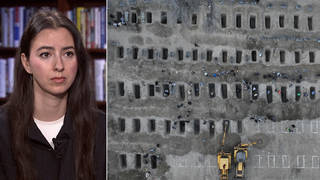
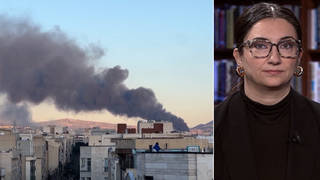
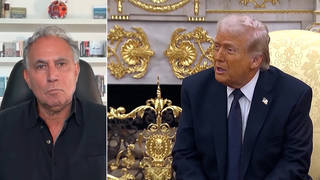
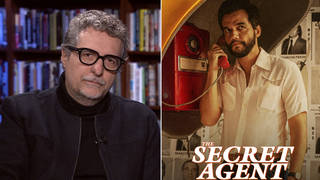

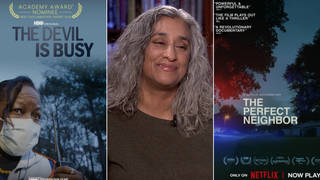
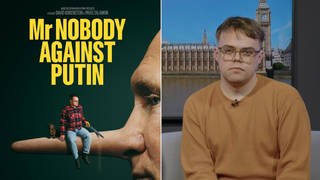

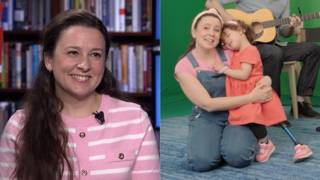
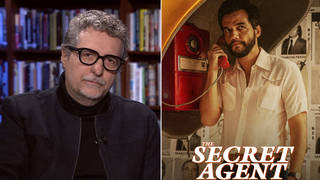
Media Options